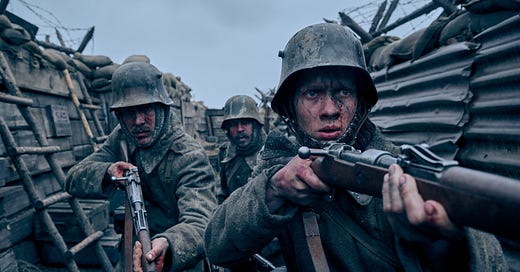All Quiet on the Western Front
This existential anti-war story puts into the muddy boots of German soldiers on the front lines of World War I.
If you found yourself enraptured by Sam Mendes “1917,” then you’ll find a similarly gruesome and gripping experience with the new German version of “All Quiet on the Western Front.”
Erich Maria Remarque’s novel has been translated to screen before, including becoming just the third film to win the Academy Award for Best Picture in 1930. It was a deliberate attempt to demystify and demolish the gallantry that had been associated with war, and show it to be the grimy, dehumanizing squalor that it is.
Director Edward Berger, who co-wrote the script with Ian Stokell and Lesley Paterson, gets us right down into the mud with the teenage German recruits, led by Paul (Felix Kammerer), who lied about his age in order to enlist in early 1917. It’s a horrific trench landscape of rotting bodies, vomit, blood and filth.
The style is rather similar to Mendes’ film, with lots of long takes and tracking shots, though it doesn’t abide to any strictures about seeming to take place in real time, without edits. Indeed, at one point the timeline jumps forward 18 months to the last days of the war, and things seemed to have changed very little.
The cinematography by James Friend is immediate and existential, making us feel like we’re right down in the pits with the soldiers. The musical score by Volker Bertelmann is haunting and minimalist, occasionally using a repeating refrain of three dire chords that seem to punch right through into our chest.
Story-wise, there isn’t much to describe. The boys land in the trenches and try to survive the barrage of explosions, bullets and deadly gas. Paul and his schoolboy friends are taken under the wing of Kat (Albrecht Schuch ), a more experienced soldier who’s become very jaded and cynical. He’s seen waves of recruits like them come and die, sometimes within days or even hours of arrival, but tries to show them a few pointers.
In the later section, there is a parallel story with a diplomat played by Daniel Brühl who knows the war is lost and is trying to bring it to a swift end so more boys like Paul don’t have to die. The contrast of his existence, riding swift trains, wearing natty suits and eating sumptuous meals, contrasts sharply with the essentially feral life of the grunt soldiers.
I was struck by one terrible moment where Paul and Kat have brought food to a wounded comrade. Another soldier lies on his stretcher looking on hungrily. Something happens to distract them — I’ll not say what — and the other man casually walks over and steals the food, wolfing it down while looking at Paul without remorse, or anger, or any instinct other than pure survival.
“All Quiet on the Western Front” may not accomplish anything new, but it takes one of the oldest anti-war stories and breathes new life into it, by showing us the mountains of death and disgrace inherent whenever men take up arms against each other.
It hits theaters Friday, Oct. 14 and will be on Netflix a couple weeks later.





